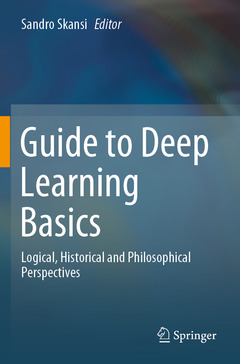Guide to Deep Learning Basics, 1st ed. 2020 Logical, Historical and Philosophical Perspectives
Coordonnateur : Skansi Sandro

This stimulating text/reference presents a philosophical exploration of the conceptual foundations of deep learning, presenting enlightening perspectives that encompass such diverse disciplines as computer science, mathematics, logic, psychology, and cognitive science. The text also highlights select topics from the fascinating history of this exciting field, including the pioneering work of Rudolf Carnap, Warren McCulloch, Walter Pitts, Bulcsú László, and Geoffrey Hinton.
Topics and features:
- Provides a brief history of mathematical logic, and discusses the critical role of philosophy, psychology, and neuroscience in the history of AI
- Presents a philosophical case for the use of fuzzy logic approaches in AI
- Investigates the similarities and differences between the Word2vec word embedding algorithm, and the ideas of Wittgenstein and Firth on linguistics
- Examines how developments in machine learning provide insights into the philosophical challenge of justifying inductive inferences
- Debates, with reference to philosophical anthropology, whether an advanced general artificial intelligence might be considered as a living being
- Investigates the issue of computational complexity through deep-learning strategies for understanding AI-complete problems and developing strong AI
- Explores philosophical questions at the intersection of AI and transhumanism
This inspirational volume will rekindle a passion for deep learning in those already experienced in coding and studying this discipline, and provide a philosophical big-picture perspective for those new to the field.
Mathematical Logic: Mathematics of Logic or Logic Of Mathematics?.- The McCulloch–Pitts Paper from the Perspective of Mathematical Logic.- From the Linguistic Turn to the Cognitive Turn and Back Again.- Why not Fuzzy Logic?.- Meaning as Use: From Wittgenstein to Google’s Word2Vec.- Rudolf Carnap, the Grandfather of Artificial Neural Networks: The Influence of Carnap’s Philosophy on Walter Pitts.- A Lost Croatian Cybernetic Machine Translation Program.- The Architecture of Geoffrey Hinton.- Machine Learning and the Philosophical Problems of Induction.- The Artificial Intelligence Singularity: What it Is and What it Is Not.- AI-Completeness: Using Deep Learning to Eliminate the Human Factor.- Transhumanism and Artificial Intelligence: Philosophical Aspects.
Date de parution : 01-2021
Ouvrage de 140 p.
15.5x23.5 cm
Disponible chez l'éditeur (délai d'approvisionnement : 15 jours).
Prix indicatif 105,49 €
Ajouter au panierDate de parution : 01-2020
Ouvrage de 140 p.
15.5x23.5 cm
Thème de Guide to Deep Learning Basics :
Mots-clés :
Deep Learning; Artificial Intelligence; Ethics of Artificial Intelligence; Connectionism; Essentialism; Philosophical Issues in Artificial Intelligence; Neural Language Models; Word2vec; Overfitting; Soft Computing; Fuzzy Logic; Computational Intelligence; History of Artificial Intelligence


